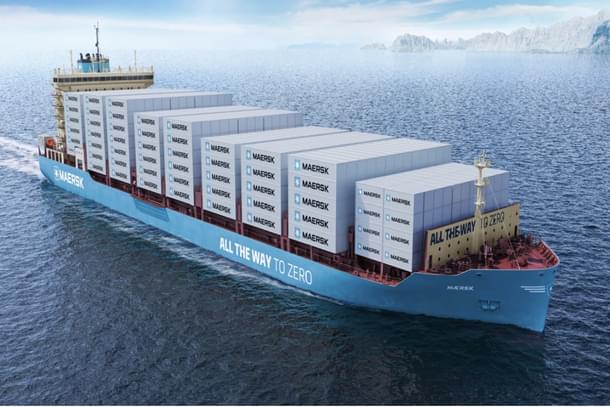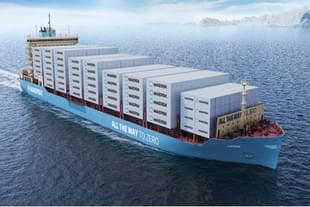Ground Reports
Maersk Selects OCI Global To Supply Fuel For Maiden Voyage Of World's First Methanol-Powered Container Ship
Amit Mishra
Jun 15, 2023, 02:36 PM | Updated 02:35 PM IST
Save & read from anywhere!
Bookmark stories for easy access on any device or the Swarajya app.


Integrated container logistics major AP Moller-Maersk said on Monday it has secured fuel for the maiden voyage of the world’s first methanol-enabled container vessel.
The 21,500 km trip from Ulsan, South Korea to Copenhagen, Denmark, will be powered by green bio-methanol sourced from Dutch producer OCI Global, when it makes debut voyage this summer.
"The green methanol market is still in its infancy and frankly we had not expected to be able to secure a maiden voyage on green methanol for this vessel,” said Morten Bo Christiansen, head of Energy Transition at Maersk.
Achieving this green fuel milestone is a significant step for the company and the industry’s efforts to reduce greenhouse gas emissions.
Bio-Methanol
Besides being an important chemical commodity, methanol has now and again been a candidate when developing alternative fuels to the crude oil-based petrol and diesel.
Almost all of the methanol produced today are derived from fossil fuels.
Around 65 per cent is based on natural gas reforming, 35 per cent is based on coal gasification, while only less than 1 per cent is based on renewable sources.
To be considered renewable, all feedstocks used to produce the methanol need to be of renewable origin, such as biomass, solar, wind, hydro, geothermal, etc.
Renewable methanol produced from biomass, such as forestry and agricultural waste and byproducts, biogas, sewage, municipal solid waste (MSW) and black liquor from the pulp and paper industry is usually called bio-methanol.

Currently, there are only a few facilities for bio-methanol production on the market, for example Sodra in Sweden.
The OCI produces its green methanol at a US-based facility from biogas captured from decomposing organic landfill waste. OCI’s green methanol is certified by International Sustainability & Carbon Certification (ISCC) in accordance with the EU Renewable Energy Directive.
"We expect a diverse green fuel mix for the future, with green bio-methanol from biomass waste being available now," Christiansen said.
The Vessel
The Danish-flagged 172-metre-long vessel is the world’s first ever container vessel sailing on green methanol.
It will be formally named by Ursula von der Leyen, the president of the European Commission at a ceremony in Copenhagen on 14 September, where it arrives on its maiden voyage, before heading to its regular operational route in the Baltic Sea.
The 2,100 TEU (twenty-foot-equivalent) container vessel will provide real operational experience for Maersk seafarers handling the new engines and using green methanol as fuel, as the company prepares to receive a fleet of new, large ocean-going methanol engine powered ships from 2024.
The Danish shipping major aims to transport a minimum of 25 per cent of ocean cargo using green fuels by 2030, compared to a 2020 baseline.
As such, Maersk has embarked on fleet renewal programme under which it has ordered 19 methanol-enabled ships. When all 19 vessels on order are deployed and have replaced older vessels, they will generate annual CO2 emissions savings of around 2.3 million tonnes.
Securing Fuel
Sourcing greener fuels remains one of the main challenges to achieving Maersk’s goal of net zero greenhouse gas emissions in 2040 and as such, the company has forged multiple partnerships with suppliers and ports to keep a steady supply.
Until now, Maersk has signed nine strategic partnerships to drive the acceleration of global production capacity for green methanol. The partners include Carbon Sink, CIMC ENRIC, Debo, European Energy, Green Technology Bank, Orsted, Proman, Wastefuel and SunGas Renewables.




